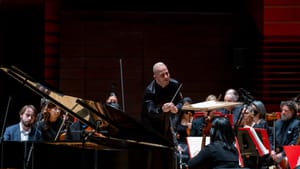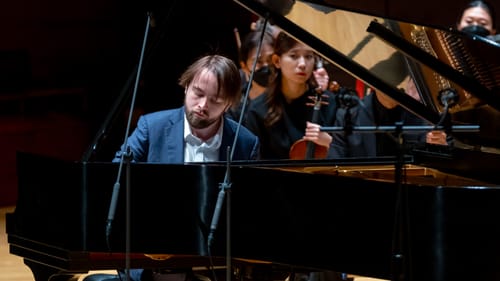Stay in the Loop
BSR publishes on a weekly schedule, with an email newsletter every Wednesday and Thursday morning. There’s no paywall, and subscribing is always free.
Unity and showmanship
The Philadelphia Orchestra presents Daniil Trifonov in its 2022-23 season opener

The program played by the Philadelphia Orchestra on October 1 overlapped significantly with the selections heard at its season-opening concert three days earlier. Despite the repertory repetition, the two experiences felt entirely different.
Gala performances like the one given on opening night are less about music and more about seeing and being seen. They start late, run long, and tend to be rife with bells and whistles. Case in point: between the conclusion of Saint-Saëns’s Piano Concerto No. 2 in G Minor and the first movement of Dvořák’s Symphony No. 8 in G Major, a movie screen was lowered from the rafters of Verizon Hall to show the audience a promotional video of the orchestra’s accomplishments over the past year. I wondered if I was about to be sold a timeshare.
These concerts also tend to feature guest performers who distract rather than enhance the experience. Such was the case on opening night, when the local dance company BalletX premiered a commission choreographed by New York City Ballet principal dancer Tiler Peck to Valerie Coleman’s Umoja, Anthem for Unity. Despite the dexterity of the soloists and the virtuosity of the orchestra’s playing under music director Yannick Nézet-Séguin, I couldn’t fully appreciate the intricacies of Coleman’s score with so many other elements to consider.
An unmitigated triumph
So it was delightful to revisit Umoja on Saturday night, sans footwork. With my ear trained to the lush expanses of Coleman’s symphonic poem, I gleaned insights into the piece that eluded me before. The title refers to the Swahili word for “unity,” and the composer provides a musical link between folk rhythms, Black American melodic traditions, and rich-toned Classicism. A founding member of the chamber ensemble Imani Winds, Coleman writes ravishingly for flute and oboe, and their gossamer expression practically floated above the dense orchestrations.
Dvořák’s Eighth emerged at both performances as an unmitigated triumph—a high point in Nézet-Séguin’s decade-long tenure at the helm of the orchestra. His interpretation balanced the Czech composer’s interpolations of his home country’s musical tradition with the work’s unmistakable Romantic influences. Nézet-Séguin drew out the harmoniously blended characteristics of the first violin section without the style ever turning lachrymose. He also effectively isolated individual voices within the fabric of the whole: Jeffrey Khaner’s feathery flute in the Adagio, Don S. Liuzzi’s thunderous timpani in the Allegro ma non troppo.
The voice of the piano
The evening’s major shift came in the choice of concerto. On opening night, Lang Lang played the Saint-Saëns with a great deal of pomp and circumstance. For the weekend’s subscription program, Daniil Trifonov returned with Liszt’s Piano Concerto No. 1 in E-Flat Major: equally showy but awash in greater complexity. Trifonov sent his fingers up and down the keyboard with enviable dexterity, dispatching the tricky trills that punctuate the piece with practiced ease, but he never relied solely on chromatic flash. He proved himself as ever a generous and supportive colleague, always in lockstep with Nézet-Séguin’s musical direction.

In the concerto’s forceful first movement, Trifonov matched the tone and color of the various instrumental solos embedded in the score—the chestnut-rich clarinet, the daringly transparent first violin. He controlled volume and dynamics like a singer, knowing just when to blend in with the orchestral forces and when to vanquish them. As the piece built to its forte conclusion, Trifonov and the orchestra came together until there was virtually no separation apparent. It was music-making at its most thrilling and most thoughtful.
Unlike Lang Lang, who basks in the adoration of his audience, Trifonov often looks like he can’t get off the stage fast enough when his performance is done. But when he’s at the keyboard, his sense of technical mastery and comfort is undeniable. And how lucky we were that he returned with a heartfelt and timely encore: the Elegy, Op. 41, No. 3 of Ukrainian composer Mykola Lysenko.
What, When, Where
The Philadelphia Orchestra presents Daniil Trifonov. Yannick Nézet-Séguin, conductor. Trifonov, piano. September 30-October 2, 2022, at the Kimmel Cultural Campus's Verizon Hall, 300 S. Broad Street, Philadelphia. $10-$169. (215) 893-1999 or philorch.org.
Masks are optional in Verizon Hall.
Accessibility
The Kimmel Cultural Campus is an ADA-compliant venue. Wheelchair seating locations and loose, upholstered seats are available in the Perelman Theater, and can be purchased online.
Sign up for our newsletter
All of the week's new articles, all in one place. Sign up for the free weekly BSR newsletters, and don't miss a conversation.

 Cameron Kelsall
Cameron Kelsall